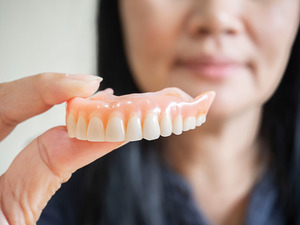
About 178 million people in the United States are suffering from tooth loss. Many people deal with this issue by wearing lifelike, comfortable dentures that make it possible to speak clearly and chew all kinds of foods again. However, if your teeth have been missing for a while, you may have experienced bone loss in your jaw. Many people think this issue can prevent them from getting dentures, but is that really true? Here’s what you need to know when looking for a way to restore your incomplete smile.
What Causes Bone Loss in the Jaw?
In many cases, the jawbone starts to deteriorate as a direct consequence of tooth loss. You may not realize it, but whenever you bite or chew something with your natural teeth, you’re providing your jawbone with important stimulation to keep it healthy. Losing your teeth means this stimulation no longer takes place, which causes your body to resorb the now-unused portion of the jaw. Bone loss tends to grow more severe the longer teeth have been missing.
Can You Still Get Dentures Even After Bone Loss?
People who have already lost some of the bone in their jaw often assume that they’re no longer eligible for dentures. But this doesn’t have to be the case! There are many situations where dentures can still be used even after part of the jawbone has been resorbed.
The impact that bone loss has on your ability to adjust to dentures depends on the specific type of dental prosthetic you get. Partial dentures are generally easier to wear since they’re attached to natural teeth. In contrast, full dentures rely on the jaw to give them support and stability, so they tend to be more strongly affected by deteriorated bone.
If bone loss is extensive enough to the point where it could prevent you from getting dentures, a bone grafting procedure might be recommended. This procedure involves graft material (usually bone taken from another part of your body) being applied to select areas of the jaw to restore bone density and volume.
Are Dentures the Right Choice for Replacing Your Missing Teeth?
Losing multiple teeth or all of your teeth generally makes dentures an option worth considering. To confirm that they’re the best choice for you, it’s necessary to schedule a consultation with your dentist. They can take a closer look at your mouth and jaw to determine whether there’s any bone loss (or another oral health issue) that needs to be addressed before you receive new teeth.
About the Author
Dr. Nicholas Brong attended the University of California, San Francisco, where he earned his Doctor of Dental Surgery. He’s fully dedicated to making sure that all of his patients get the care they need to enjoy the best possible dental outcomes. His Rochester practice, Zumbro Family Dental, offers dentures as a way to fill the space left by lost teeth. To schedule a consultation with Dr. Brong, visit his website or call (507) 288-1066.





